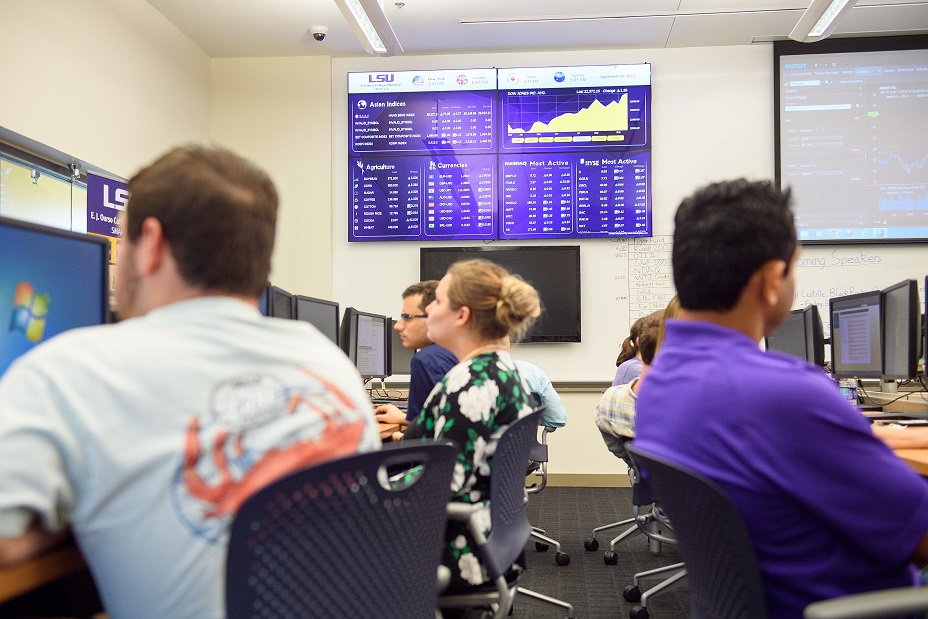Bachelor of Science in Finance
A career that pays dividends.
As a finance major, you will learn how individuals, businesses, and organizations acquire and use capital efficiently to create value. Two basic elements of finance include the tradeoff between expected returns and risk and the importance of the timing of future cash flows. This degree program offers four distinct career tracks for students to focus their studies – asset management, commercial banking, commercial real estate, and investment banking/corporate finance – which lets students align their knowledge and skills with their interests and goals.
What You'll Learn
The Bachelor of Science in Finance is a 120-hour program that provides students with an overview of the basic theory and practice of finance. As a finance student, you will analyze financial statements, develop and apply financial modeling skills, and apply principles of asset allocation and diversification to evaluate portfolio performance.
Customized Coursework That Fits Your Career Goals
The Department of Finance offers students the ability to focus their coursework on one of the following career tracks to align with their interests and goals. The career tracks outlined here are suggested paths and courses for each. Students can take courses from other tracks to complete their 15-hour finance elective requirement (at least six hours 4000-level).
Track contact: Kurtay Ogunc
The Asset Management Career Track prepares students majoring in finance for lucrative
and rewarding career paths in portfolio management, equity analysis, derivatives trading,
fixed income markets, and alternative investments.
Students are encouraged to complete Bloomberg Market Concepts ideally during their sophomore year, and take the SIE (Securities Industry Essentials) exam by the end of their junior year. Both will prepare students for a rigorous study of finance and asset management throughout college.
High achieving and aspiring students are advised to take Level 1 of the CFA designation, the most prestigious in all of finance. Additionally, students are advised to take Level 1 of the CAIA (Chartered Alternative Investment Analyst) designation, if they are interested in alternative investments such as hedge fund strategies.
Engaged and high GPA students will have a chance to go on field trips to New York and Houston, and meet with LSU alumni and other professionals at various fund managers, financial institutions and consulting firms such as BlackRock, Goldman Sachs, Varadero Capital, Bloomberg, Franklin Templeton, EnCap Investments, Denham Capital, Macquarie Bank, Amegy Bank, and Capital One.
Student competitions, such as Bloomberg Trading Challenge, ETF Global Portfolio Challenge, CFA Research Challenge, Southeastern Hedge Fund Competition, and University of Georgia Stock Pitch Competition, are highly recommended.
Core Courses:
- FIN 3716 Principles of Finance
- FIN 3717 Fundamentals of Corporate Finance
- FIN 3826 Fundamentals of Asset Management
- FIN 4820 Financial Modeling and Analytics
- FIN 4830 Financial Statement Analysis
Asset Management Track Electives:
- FIN 3636 Financial Markets and Institutions
- FIN 3460 Risk Management
- FIN 3840 Fixed Income Securities
- FIN 3845 Student Managed Investment Fund
- FIN 3910 Topics in Finance
- FIN 4828 Security Analysis and Portfolio Management
- FIN 4840 Asset Allocation
- FIN 4850 Financial Derivatives
- FIN 4910 Advanced Topics in Finance
questions? email kurtay ogunc.
Alumni Impact Statement
As the President of the Asset Management Academy, which Dr. Kurtay founded in 2019 to foster research in investment management among undergraduate students, I can attest that many students benefited a great deal from a rigorous program and landed jobs/internships at the largest fund managers in the world such as Fidelity, PIMCO, Deutsche Asset Management, and PGIM, to name a few.
Caroline Crawford, '22, Account Analyst, PIMCO
Track contact: Brian Andrews
The Commercial Banking Career Track is a set of specially designed electives and activities
that will expose students to careers in commercial banking and prepare them for rewarding
careers based on their interests. The commercial banking industry will be heavily
involved with the program to ensure that materials and experiences are current and
relevant to the field. Events, competitions, and other activities will allow students
to engage with banking professionals; industry involvement is critical for the success
of the program and development of our students.
Freshman Year (or year of entry) and all years thereafter
- Become a student member of the Risk Management Association or other industry group (an “industry student membership”)
- Participate in CBCT activities
- Volunteer at one CBCT conference or industry event
- Maintain a minimum 3.0 GPA
Sophomore Year
- Enter CBCT Mentorship Portal – Students will be matched with industry professionals and upper class students as mentors to help students understand the business of commercial banking and its potential as a career path.
Junior Year
- Take finance electives specially designed for the CBCT
- Enter CBCT Internship Portal – Students will be prepared for summer internships through coursework and seminars, culminating in a selection process that matches students with internship employers.
- Begin commercial banking research for the Department of Finance
Senior Year
- Continue finance electives specially designed for the CBCT
- Enter CBCT Career Portal - Students will be prepared for career choices through coursework and seminars and assisted with career decision making.
- Continue commercial banking research
Other opportunities available through the program:
- Industry functions
- Service projects
- Competitions including Community Bank Case Study Competition and FDIC Academic Challenge
Core Courses:
- FIN 3716 Principles of Finance
- FIN 3717 Fundamentals of Corporate Finance
- FIN 3826 Fundamentals of Asset Management
- FIN 4820 Financial Modeling and Analytics
- FIN 4830 Financial Statement Analysis
Commercial Banking Track Electives:
- FIN 3636 Financial Markets and Institutions
- FIN 3632 Bank Administration
- FIN 3610 Credit Essentials
- FIN 3460 Risk Management
Track contact: Brian Andrews
The Commercial Real Estate (CRE) Career Track prepares students for lucrative and
rewarding career paths in brokerage/sales, development, property management, asset
management, private investment, and many other paths within this exciting field.
Students are encouraged to participate in the CRE Cohort from their freshman year and will receive a student membership in the International Council of Shopping Centers (ICSC), allowing them access to programs, mentorships, scholarships, internships, certificate programs, and more.
Engaged students will have the chance to attend industry conferences across the country and participate in CRE events within the region.
Finally, this program promotes interaction between students and professionals so that students can learn about potential career paths from those already in the industry.
Core Courses:
- FIN 3716 Principles of Finance
- FIN 3717 Fundamentals of Corporate Finance
- FIN 3826 Fundamentals of Asset Management
- FIN 4820 Financial Modeling and Analytics
- FIN 4830 Financial Statement Analysis
Commercial Real Estate Track Electives:
- FIN 3351 Principles of Real Estate
- FIN 3352 Real Estate Investment and Valuation
- FIN 3353 Real Estate Finance
- FIN 4354 Real Estate Development
Track contact: Mike Kirby
The Corporate Finance & Investment Banking Career Track prepares students for various
roles in corporations and investment banks, typically starting at the analyst level.
This area of finance deals with analyzing investment projects for corporations, making
long-term investment decisions, taking private companies public (IPO process), mergers
and acquisitions, buyouts, restructurings, and takeovers as well as managing private
equity funds.
Core Courses:
- FIN 3716 Principles of Finance
- FIN 3717 Fundamentals of Corporate Finance
- FIN 3826 Fundamentals of Asset Management
- FIN 4820 Financial Modeling and Analytics
- FIN 4830 Financial Statement Analysis
Investment Banking/Corporate Finance Track Electives:
- FIN 3636 Financial Markets and Institutions
- FIN 3718 Multinational Managerial Finance
- FIN 3720 Valuation, M&A and Buyouts
- FIN 4740 Venture Capital and Private Equity
- FIN 4910 Investing in Financial Distress, Restructuring, and Bankruptcy Opportunities
enhance your studies

CFA® University Affiliation
The E. J. Ourso College of Business has a CFA® University Affiliation from the CFA Institute, a global association for investment professionals that awards the Chartered Financial Analyst designation. The CFA affiliates with globally diverse, high-profile institutions that cover a significant portion of the CFA Program Candidate Body of Knowledge and embrace the CFA Institute Code of Ethics and Standards of Professional Conduct in their degree programs.
CFA University Affiliation recognition provides a signal to potential students, current students, and the marketplace that the E. J. Ourso College's curriculum is closely tied to professional practice and is well suited to preparing students to sit for the CFA exams.
The CFA Institute administers the CFA and CIPM curricula and exam programs worldwide, publishes research, conducts professional development programs, and sets voluntary ethics-based professional and performance-reporting standards for the investment industry. The CFA Institute has more than 135,000 CFA charterholders in 133 countries and territories. More information may be found at www.cfainstitute.org.
Students interested in learning about a path to taking the CFA Exam should read about
the exam prep class in the menu below and/or speak with Professor Gary Sanger sanger@lsu.edu.
CFA Level 1 Exam Prep Class
FIN 4910 Instructor: Darren Fournerat
- Students must be registered for the CFA Level 1 exam prior to the first day of class. This gives access to all study materials, including mock exams.
-
Students taking the class in the fall semester should plan to take the Level 1 exam the following February.
-
Students taking the class in the spring semester should plan to take the Level 1 exam in May, which will be administered just after classes end.
- Students can apply for an LSU student scholarship, which reduces the total cost to $600. LSU receives only six scholarships per year, making them extremely competitive.
-
Students not receiving a scholarship are encouraged to meet the early registration deadline for the exam they plan to take. This reduces the total cost to $1,140 from the full price of $1,490*. CFA exam dates and fees
-
Successful students report an average study time of 300 hours – please be sure you can commit to this level of study!
- CFA Exam Dates and Fees | Interactive Tool
*Pricing current as of Oct. 2025
Accelerated MS Finance Program
This degree program allows students complete both a BS and MS in Finance in 4-4.5 years. Students interested in the Accelerated MS Finance program should contact Dr. Cliff Stephens, the director of our master's programs.
Alumni Impact
Discover how LSU Finance alumni have turned their education into lasting success, sharing insights on how the program empowered their careers and shaped their futures
“After joining the Asset Management Academy, I began a research project on hedge fund strategies and received a grant from LSU Discover to conduct my research. These efforts led me win 1st place at the LSU Discover research competition. More importantly, I was hired as an equity analyst at a top ten global asset management firm in New York City following a summer internship.”
Jared Cyprian, CFA Charterholder,
Class of 2022

“My finance degree provided an invaluable opportunity for travel to NYC, San Antonio, and Houston to network with accomplished business leaders, including many LSU alumni. Some remain available as mentors several years after graduation. Faculty and other departmental resources provided opportunities to apply classroom knowledge to real-world situations and develop the skills for success in my role as an M&A Analyst for a public company in healthcare services.”
Matthew Crapanzano (BS Finance '19)
“There is no doubt FIN 4830’s financial modeling and forecasting case studies were extremely helpful to my Excel skill development and critical to understanding how to construct a functional, three statement financial model from scratch. This practical training allowed me to clearly differentiate myself during a competitive recruiting process for a valuation & transaction advisory position after graduation.”
Camille Dunlap (BS Finance '21)
"LSU Finance provided me with a solid, fundamental understanding of Financial Statement Analysis and financial modeling that I utilize in my job every day. More importantly, it taught me what a commercial lender looks for when evaluating a company or loan opportunity. The course work and case study assignments were challenging and interesting and ultimately led me to choose a career in commercial banking in Houston, Texas.”
Tori Nunnally (BS Finance '21)
"My experience at the LSU Department of Finance has shaped me into the professional I am today and provided me with the tools to succeed at my job servicing institutional investors. The department balances the quantitative lessons learned in the classroom with real-world professional development outside the classroom, like through the department trip to New York."
Sam Chastain, BS Finance '19, MBA '20

Career Path
A finance degree applies to almost any industry. Our program will provide you with a unique set of knowledge, skills, and experience for each of the various roles in the finance industry.
Career Paths to Pursue
- Financial analyst
- Investment banker
- Equity analyst
- Portfolio manager
- Investment consultant
- Financial advisor
- Commercial banker
- Commercial real estate professional
Where Our Graduates Work
Our graduates are hired by a variety of employers, such as energy companies, consulting
groups, banks and financial institutions, private equity firms, wealth management
companies, real estate investment trusts, and developers.
Investment Banking
CITI
Credit Suisse/UBS
Deutsche Bank
Evercore
Harris Williams
JPMorgan Chase
Piper Sandler
Stephens, Inc.
Tudor Pickering & Holt
Asset Management
BlackRock
Dimensional Fund Advisors
Fidelity
Investec
Millennium
PIMCO
Raymond James
TIAA
Varadero Capital
Commercial Banking
Amegy
Cadence
Capital One
First Horizon
Frost Bank
Hancock Whitney
JPMorgan Chase
Texas Capital Bank
Wells Fargo
Valuation & Advisory
BDO USA, LLP
Deloitte
EY
Grant Thornton
Houlihan Lokey
KPMG
Postlethwaite & Netterville
PwC
Weaver
General Corporate Finance
Albemarle
Blue Cross Blue Shield
BXS Insurance
Chevron
Exxon
LWCC
Ochsner
Shell
Turner Industries
Your Next Step
The Accelerated Master of Science in Finance
Many undergraduate finance students choose to continue their studies by earning an accelerated MS Finance. This program gives students the opportunity to complete both a bachelor's and master's in finance in 4-4.5 years. Learn about the program and its benefits.

Contact Us
Department of Finance
2900 Business Education Complex
501 South Quad Drive
Baton Rouge, LA 70803
225-578-6291
finance@lsu.edu
Kurtay Ogunc
Finance Undergraduate Advisor
2904 Business Education Complex
225-578-6291
kurtay@lsu.edu
Office of Business Student Success
2000 Business Education Complex
225-578-3211
advisor@lsu.edu